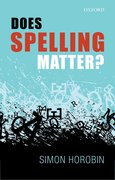The Telegraph Hay Festival is taking place from 23 May to 2 June 2013 on the edge of the beautiful Brecon Beacons National Park. We’re delighted to have many Oxford University Press authors participating in the Festival this year. OUPblog will be bringing you a selection of blog posts from these authors so that even if you can’t join us in Hay-on-Wye, you won’t miss out. Don’t forget you can also follow @hayfestival and view the event programme here.Simon Horobin will be appearing at The Telegraph Hay Festival on Tuesday 28 May 2013 at 2.30pm to ask: does spelling matter? More information and tickets.
By Simon Horobin
‘The apostrophe is the most troublesome punctuation mark in English, and perhaps also the least useful. No other punctuation mark causes so much bewilderment, or is so often misused.’
–R.L. Trask, The Penguin Guide to Punctuation

The recent decision by Devon County Council to drop the apostrophe from its road signs was met with dismay and anger by those concerned about the preservation of linguistic standards. Lucy Mangan, writing in The Guardian, branded it an ‘Apostrophe Catastrophe’ which ‘captures in microcosm the kind of thinking that pervades our government, our institutions, our times’, drawing parallels with the government’s handling of the banking crisis, binge-drinking and sexual assault. Similar prophecies of doom followed the decision by the bookseller Waterstones to drop the apostrophe from its shop names. Writing in the Daily Mail, Lindsay Johns lamented this wanton disposal of the rules of grammar which enable us to communicate. But is the preservation of the apostrophe really so crucial to the well-being of our society? Would consigning the apostrophe to the dustbin really threaten the future of our language as a means of communication?
It is seldom recognised by its guardians that the apostrophe is purely a feature of written language, with no spoken language correspondence. If we can do without it in speech, then why is it necessary in writing? Even in writing the apostrophe is a relatively recent innovation; it was first introduced into English printed books in the 16th century to indicate an elision or a contraction, as it still does today in she’ll, can’t, it’s. In the 17th century its use was extended to indicate possession in singular nouns, the boy’s book, where the –s ending was understood either as an elision of the earlier ending –es, or erroneously as a reduced form of the possessive pronoun his. Further confusion was introduced in the 18th century when the apostrophe was extended to plural possessives, the boys’ books, where nothing has been omitted.
The use of the apostrophe to signal both elision and possession is the cause of much of today’s confusion, most notoriously in the distinction between it’s and its. For Lynne Truss the rule is simple and the punishment for breaking it should be suitably brutal:
‘Getting your itses mixed up is the greatest solecism in the world of punctuation. No matter that you have a PhD and have read all of Henry James twice. If you still persist in writing, “Good food at it’s best”, you deserve to be struck by lightning, hacked up on the spot and buried in an unmarked grave’.
–Lynne Truss, Eats Shoots and Leaves.
But is such harsh condemnation really warranted? Since the apostrophe can signal possession, it is natural to assume that the neuter possessive its should also have an apostrophe. The pronoun its was first introduced in the 17th century to replace an earlier form his, which overlapped unhelpfully with the masculine pronoun. Because it was formed by adding a possessive ending to the subject pronoun it, the new pronoun was initially written it’s; a spelling which persisted until the 19th century.
Insecurity about where to place the apostrophe increasingly leads to its omission, so that we frequently find examples of its mine, as well as its insertion in contexts where it isn’t required. Particularly common is the addition of an apostrophe to plurals, known as the ‘greengrocers’ apostrophe’; so-called because it is thought to be particularly prevalent in signs advertising apple’s and orange’s. There is some historical justification for this error, however, since the apostrophe was originally inserted in the plurals of words which ended in vowels, like folio’s and opera’s, and still is in cases like ‘p’s and q’s’, ‘do’s and don’t’s’.
The apostrophe has long been a polarising issue among otherwise rational people. George Bernard Shaw, a vocal critic of English spelling, wrote cant and hes instead of can’t and he’s, arguing that the apostrophe was entirely redundant: ‘There is not the faintest reason for persisting in the ugly and silly trick of peppering pages with these uncouth bacilli’. Lewis Carroll, on the other hand, inserted additional apostrophes, preferring spellings like sha’n’t and ca’n’t as the proper contractions of shall not and can not. While there are those today who happily omit apostrophes in emails (not e’mails) and text messages (or txt msgs), there are those who firmly insist on its inclusion. The self-appointed monitor of Twitter posts, YourorYou’re, retweets messages in which these two words are confused with the simple comment: ‘WRONG!’.
The media storm that followed Devon County Council’s announcement resulted in the decision being overturned. Residents of Tiverton’s Beck’s Square and Blundell’s Avenue can sleep peacefully in their beds; Lucy Mangan can put away her tin of paint. The precious apostrophe is safe. For now.
Simon Horobin is Professor of English at the University of Oxford and a Fellow of Magdalen College. His book, Does Spelling Matter?, examines the role of spelling today, considering why English spelling is so difficult to master, whether it should be reformed, and whether the electronic age signals the demise of correct spelling. He also writes a blog about English spelling.
Subscribe to the OUPblog via email or RSS.
Subscribe to only language articles on the OUPblog via email or RSS.
Image credit: Greengrocer’s apostrophe correction by Sceptre, [Creative Commons] via Wikimedia Commons.



Australian street signs omit apostrophes and nobody notices.
I think an apostrophe is only needed when it avoids obvious confusion – e.g she’ll/shell, and prevents ‘ss’ for possessive nouns ending in ‘s’. The Princess’s tiara. The dogs’ owner.
Otherwise it introduces confusion to greengrocers and people who have to think about other things when theyre writing.
If you have to think about it – leave it out.
What I object to most is the idea that if something is slightly difficult we should dumb it down. Surely the best approach would be to educate people instead…
I find it funny that the apostrophe was misused in this article…”[…]our times’.” What is the “times'” possessive of?